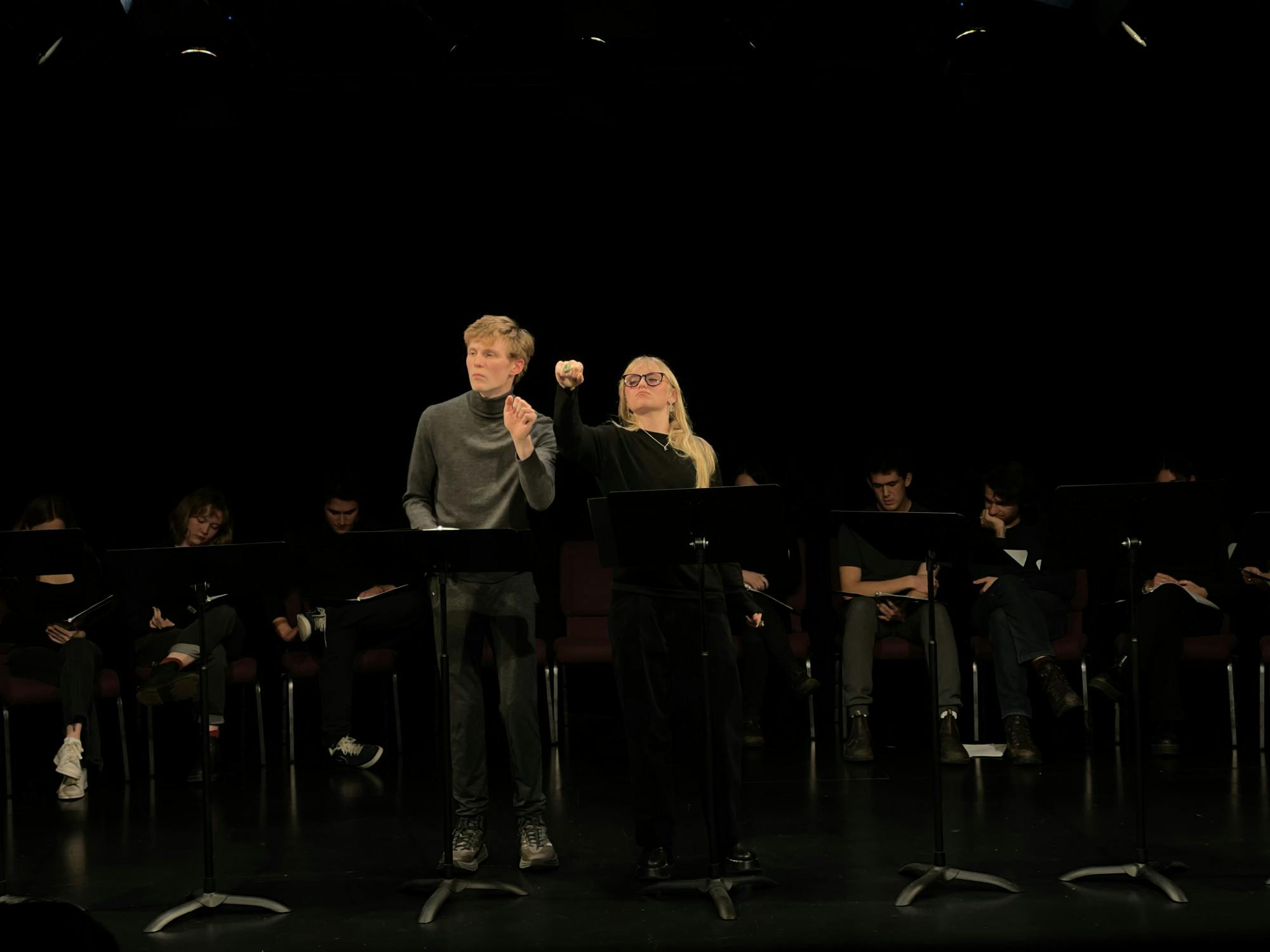A reading of “The Aristocrats,” an original play co-written by Sophie Cohen ’26 and William Herff and co-directed by Cohen and Kate Clark ’25, was presented on stage on Friday, Jan. 26 at 7:30 p.m. in Wilson Hall.
Set in an unspecified place and time in history, “The Aristocrats” chronicles the exploits of two amusing castle guards tasked with protecting the kingdom. Ironically, however, the guards are troublemakers themselves. According to Cohen, the play is an “absurd comedy … kind of zany and mad.”
Before coming to Dartmouth, Cohen gained experience writing comedy for fun with her friends. Through her high school’s comedy publication, she met William Herff, a second-year student at Duke University, whom with she co-wrote “The Aristocrats.” Cohen explained that she has written numerous sketches with Herff, who has become someone she relies on for feedback.
“I think we were really just going for a comedy … and then it ended up being a [full] play,” Cohen said. “[Herff] really likes flowery, interesting language, and I like quick jokes, [so] I feel like our comedic sensibilities just combined really well.”
The 14-member cast of the staged reading consisted of students with a range of experience on stage. They included members of Dartmouth’s various performance groups — such as the sketch comedy troupe Can’t Sell Culture, the Shakespeare company The Rude Mechanicals and the Displaced Theatre Company — as well as those involved with the College’s theater department. According to Cohen, she did not hold formal auditions through the theater department, but instead had the actors read lines to her and delegated parts accordingly.
Eloise Langan ’27, who played one of the guards, knew Cohen from Cohen’s involvement in Can’t Sell Culture. She said that she loved the experience of working with a unique crew of students.
“Because a lot of the cast were friends of [Cohen’s], it’s like we were all just there to support her endeavors,” she said. “It was also just so much fun meeting these new people … and it was definitely a positive environment to work in and be in from beginning to end.”
Student production coordinator Michael Ganio explained how read-throughs are an important and routine step pursued upon completion of any script draft in theater.
“The reason this form — this play reading form — exists is for the benefit of the playwright to hear their play acted [out] … in a room [with] audience members,” Ganio said.
Cohen submitted the script with a proposal for a Student Production Slot offered by the theater department and was officially informed of its approval for the Jan. 26 performance just 10 days prior to that date.
The department supported the reading by granting use of the space in Wilson Hall, one of two new theater spaces built during the Hopkin Center for the Art’s ongoing renovation. The department also provided space for rehearsals, light and sound equipment, logistical components such as props and a staff assistant to help out, according to Ganio.
The staged reading opened with the actors’ procession onto chairs located behind the central stage area on which music stands were set up. They rose to take positions at the stands to deliver their lines throughout the roughly hour-long production.
Cohen has also organized a presentation of the play independently of the theater department, a more orchestrated staged reading scheduled for March 1 in Collis Common Ground. Langan described the rehearsal process for the staged reading prior to the March 1 show as laid back.
“[It was mostly] running the scenes and then doing notes, and just talking about our characters and figuring out our motivations and our objectives and how they overlap in the story,” she said. “It’s definitely more low-stress, [but] obviously you still take it very seriously.”
“The Aristocrats” was Cohen’s first experience working in playwriting and directing. After this first foray, Cohen hopes to pursue playwriting and work in comedy after college, particularly as a writer on a sitcom.
“I think [comedy] is a really good way to form community,” Cohen said. “I think there's a big trend for people to have dram-coms and rom-coms, [and] I obviously love a lot of stuff in those genres. But I think the point of that is people want to evoke emotion, [and] I think comedy can do that too — without jerking a tear.”




